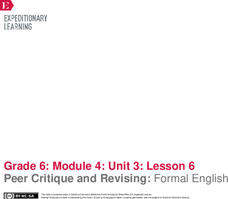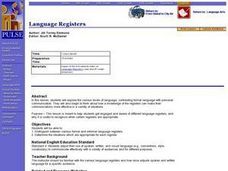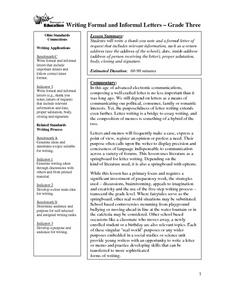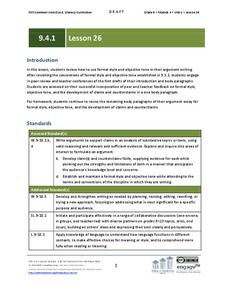ReadWriteThink
Style-Shifting: Examining and Using Formal and Informal Language Styles
Your high schoolers are probably versed in two languages: formal language, and informal conversation. Help them identify the correct language style for their audience and context with a thorough lesson plan and examples of different...
Curated OER
Formal versus Informal Language
Engage in an activity that focuses on the concepts of formal and informal language use. Middle and high schoolers compare and contrast each style by using a Venn diagram that includes some examples. They read and hear a passage of lyrics...
English Enhanced Scope and Sequence
Differentiate between Formal and Informal Language
The Pledge of Allegiance, the Gettysburg Address, the National Anthem, and the Preamble to the Constitution all get close attention in an exercise that asks learners to rewrite these formally-worded documents into informal language....
Curated OER
Formal and Informal Language
“C u l8r @ skool.” As part of a study of formal and informal language, class members examine excerpts from Lil’ Boosie lyrics, the Emancipation Proclamation, a speech by Martin Luther King. Links to the resources not provided; however,...
EngageNY
Peer Critique and Revising: Formal English
Dear Sir or Madam: What's the difference between formal and informal language? Scholars focus on using formal English and transitions in their position papers. After revising their rough drafts, they engage in the peer editing process...
Curated OER
Diction: Formal and Informal Language
Coke or Pepsi? Is it the taste or the advertising that determines preference? As part of a study of diction, class members examine two passages, one formal and one informal, about Coca-Cola and Pepsi. In addition, they consider word...
One Stop English
A Lesson on Register
The classroom might not be the best place for informal language, but it's a great place to teach middle and high schoolers how to identify the correct language register for their audience. A short lesson on formal and informal language...
EngageNY
End of Unit Assessment: Presentation of Position
What is the difference between formal and informal language? Pupils rewrite their position speeches to adapt them for an audience of adults. Next, they present their speeches in small groups, attempting to answer the question, "Which...
Curated OER
Further Improvements of Writing Skills
Improve writing skills by finding a personal writing style, using descriptive language effectively, and using precise language. Middle schoolers discuss individual style in writing and formal and informal language. They utilize figures...
Curated OER
Writing an Informal Letter
What is the difference between formal and informal letter writing? Who gets a formal letter? What about an informal letter? This reference page presents different introductions and phrases you might see in each type of letter, and then...
Curated OER
From Formal To Slang
Tenth graders define the term slang, explaining its various social, historical, and racial contexts, so as to articulate when it can be appropriately used as a means of effective communication. They use their own personal slang lexicon,...
University of Arizona
Language Registers
Do you speak to your parents the same way you speak to your friends? The differences between formal and informal language are highlighted in this exercise. Groups are asked to select a scenario and script different dialogues that might...
EngageNY
Summarizing Complex Ideas: Comparing the Original UDHR and the "Plain Language" Version
The eighth lesson plan in this series continues the focus on vocabulary and increasing young readers' awareness of academic language. Pairs of learners participate in a short vocabulary review activity called Interactive Words in which...
Curated OER
Writing Formal and Informal Letters
Third graders write a thank-you note and a formal letter of request that included relevant information, such as a return address, date, inside address, proper salutation, body, closing, and signature. They write an imaginary letter to...
EngageNY
End of Unit Assessment: Drafting the Informative Consumer Guide
Not all sandwiches are edible. Scholars use a Quote Sandwich graphic organizer to draft the written content of their informative consumer guides. Additionally, they view a mini-lesson plan on formal writing.
Beacon Learning Center
Beacon Lesson Plan Library: Formal or Informal?
Start talking trash with your elementary English class! Then lead a discussion comparing formal and informal language. Divide the class into groups to answer a questionnaire and analyze a set of sentence cards to analyze. This is a cool...
Curated OER
Writing Formal Letters
Help your young writers recognize the importance of composing formal letters. Middle schoolers read letters written by Thomas Jefferson and analyze the components that make it a formal letter. They will then compose their own letters.
Curated OER
Formal and Informal Letters
In this formal and informal letters worksheet, pupils change eighteen informal words into formal words. Students then complete one informal and formal letter with fill in the blank answers.
EngageNY
Drafting Body Paragraphs
That's just the style. Learners begin with a mini-lesson about formal writing style. They then use what they learned about formal writing to begin the body paragraphs for their End of Unit 1 Assessment Prompt: Adversity in the Middle...
Curated OER
Be Your Own Chief Editor
The value of this punctuation and grammar lesson is in the SMART board presentation, which takes pupils through the proofreading process. It would be a good way to introduce the idea of proofreading in your class before beginning a unit...
Curated OER
Letter Writing - Formal
Although rarely used these days, letter writing is still a form of writing reviewed in schools. After examining written letters, middle schoolers discuss characteristics of a formal letter and its parts. They choose a famous person to...
Curated OER
Formal VS. Informal
Students each get a copy of the "Formal vs. Informal" task sheet. They read the sentences twice and students put a check mark in the appropriate column on the task sheet. Students explain orally why the form of address is formal or...
Virginia Department of Education
Determining Purpose and Audience
Build the writing skills of your junior high wordsmiths with activities that introduce many essential skills of writing. As a class, they develop working definitions of formal vs. informal writing, explore different categories of...
EngageNY
Grade 9 ELA Module 4, Unit 1, Lesson 26
The focus of the day's instructional activity is methods for creating a formal style and objective tone in an argument essay. After examining models, pairs engage in peer review of their essay drafts and continue to revise while...

























